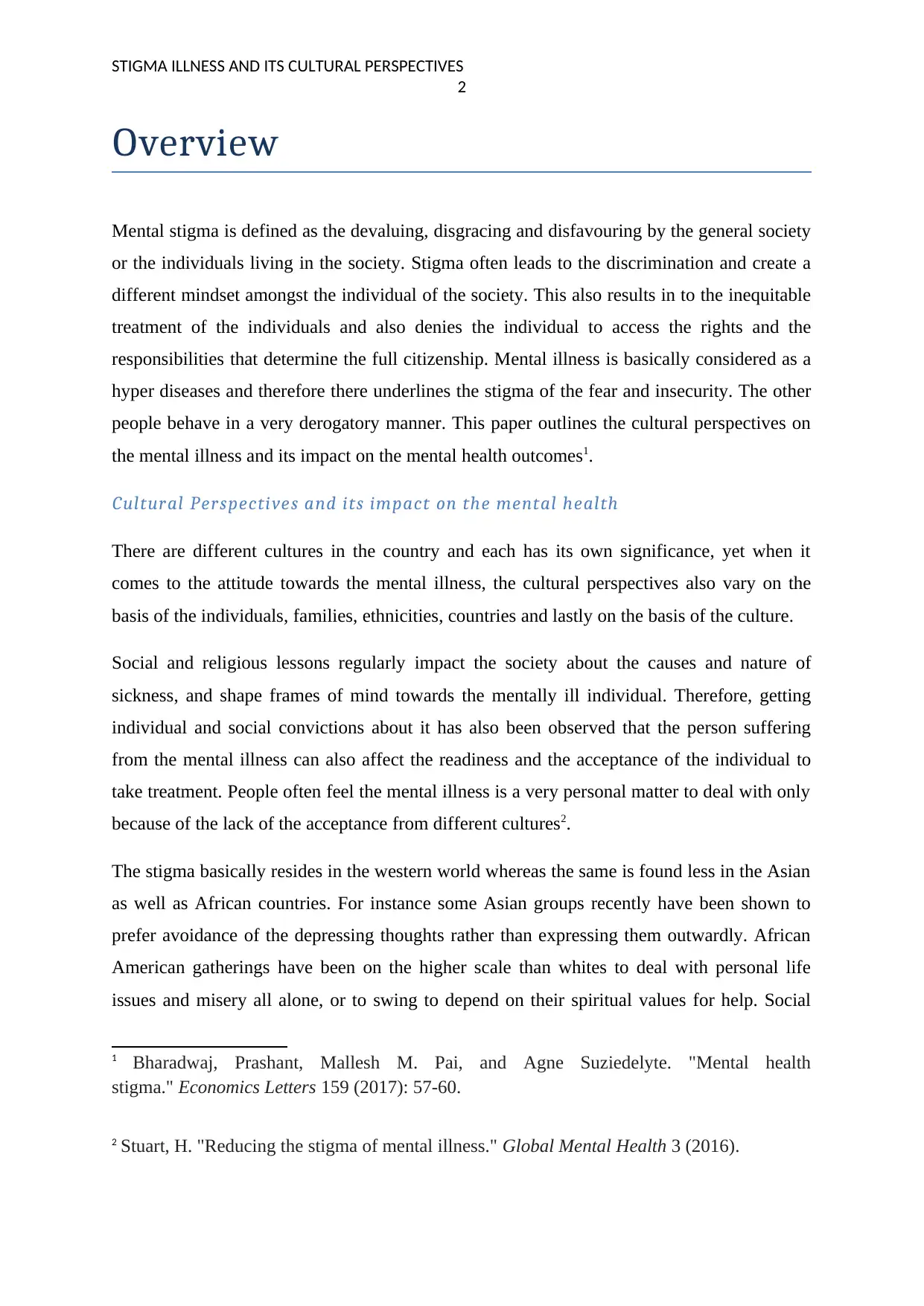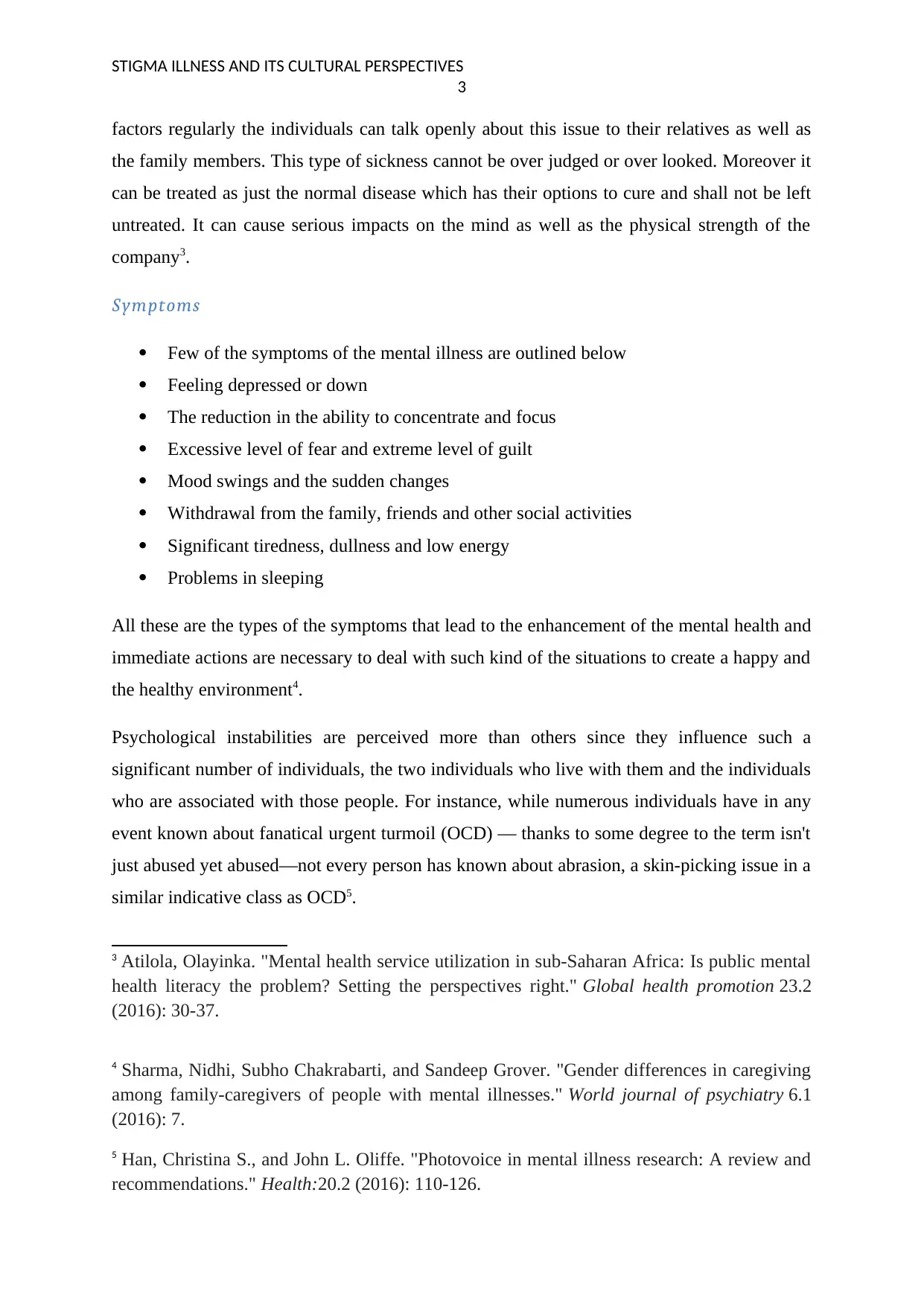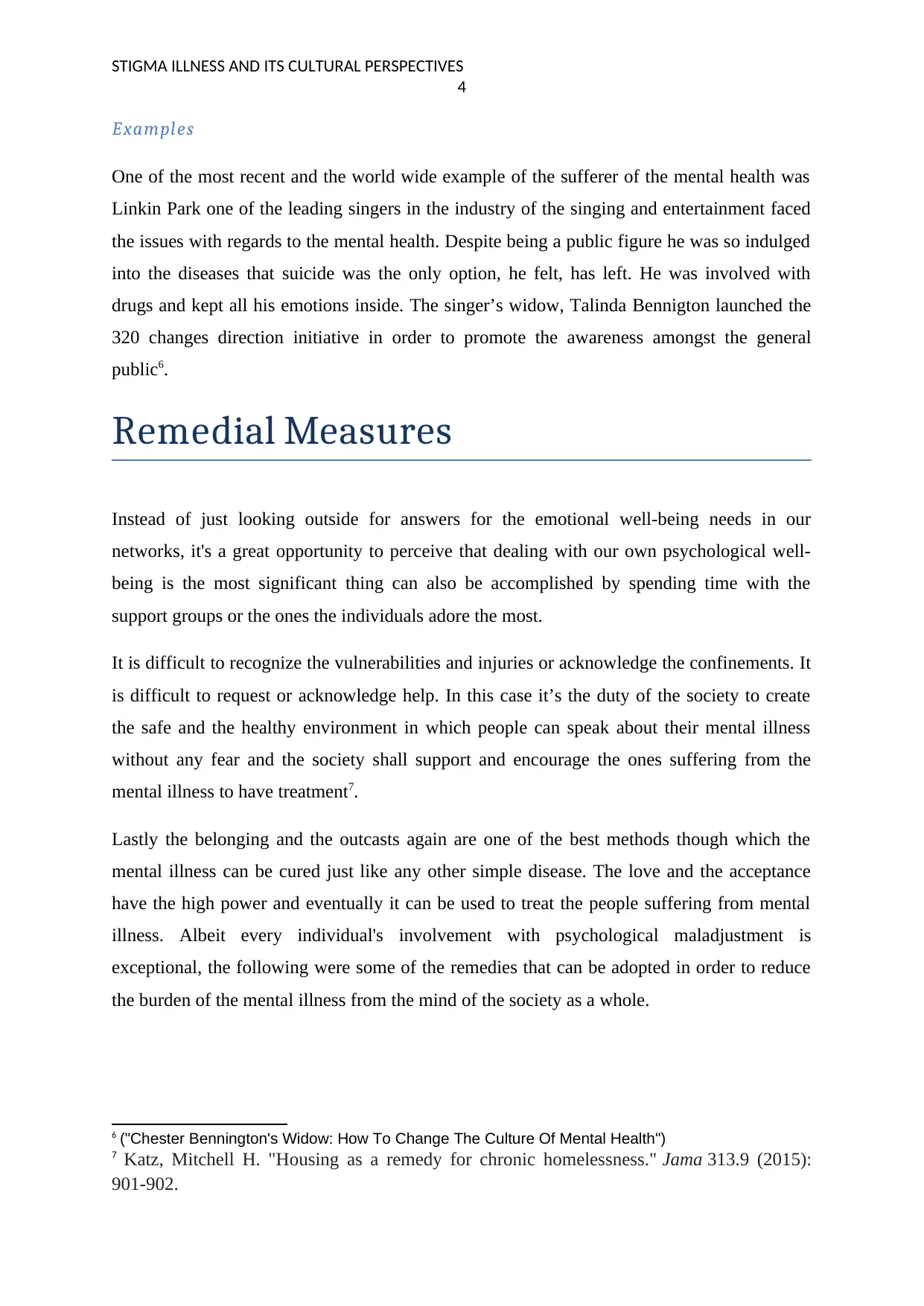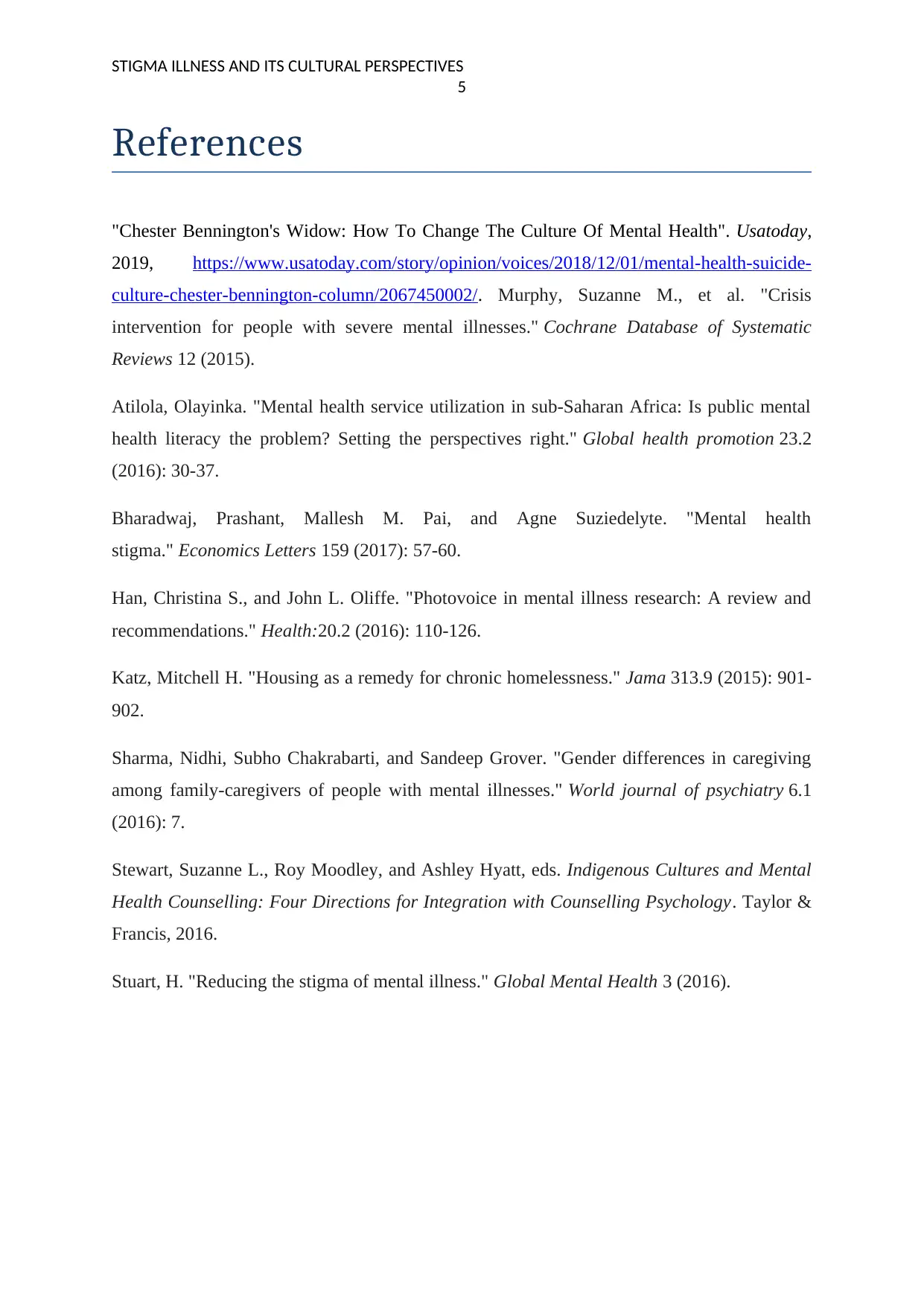Exploring Cultural Perspectives on Mental Illness Stigma
VerifiedAdded on 2023/01/23
|5
|1446
|52
Essay
AI Summary
This essay delves into the multifaceted issue of mental illness stigma and its diverse cultural perspectives. It begins by defining mental stigma as the devaluation and discrimination faced by individuals with mental health conditions, highlighting its impact on equitable treatment and access to rights. The paper emphasizes the varying cultural attitudes towards mental illness, influenced by social, religious, and individual beliefs. It explores how these perspectives affect treatment acceptance and the manifestation of symptoms. The essay provides examples, including the experience of Linkin Park's lead singer, and proposes remedial measures such as fostering supportive environments and promoting acceptance to reduce the burden of mental illness. The essay references several sources to support its arguments.

Running head: STIGMA ILLNESS AND ITS CULTURAL PERSPECTIVES 1
STIGMA ILLNESS AND ITS CULTURAL PERSPECTIVES
STIGMA ILLNESS AND ITS CULTURAL PERSPECTIVES
Paraphrase This Document
Need a fresh take? Get an instant paraphrase of this document with our AI Paraphraser

STIGMA ILLNESS AND ITS CULTURAL PERSPECTIVES
2
Overview
Mental stigma is defined as the devaluing, disgracing and disfavouring by the general society
or the individuals living in the society. Stigma often leads to the discrimination and create a
different mindset amongst the individual of the society. This also results in to the inequitable
treatment of the individuals and also denies the individual to access the rights and the
responsibilities that determine the full citizenship. Mental illness is basically considered as a
hyper diseases and therefore there underlines the stigma of the fear and insecurity. The other
people behave in a very derogatory manner. This paper outlines the cultural perspectives on
the mental illness and its impact on the mental health outcomes1.
Cultural Perspectives and its impact on the mental health
There are different cultures in the country and each has its own significance, yet when it
comes to the attitude towards the mental illness, the cultural perspectives also vary on the
basis of the individuals, families, ethnicities, countries and lastly on the basis of the culture.
Social and religious lessons regularly impact the society about the causes and nature of
sickness, and shape frames of mind towards the mentally ill individual. Therefore, getting
individual and social convictions about it has also been observed that the person suffering
from the mental illness can also affect the readiness and the acceptance of the individual to
take treatment. People often feel the mental illness is a very personal matter to deal with only
because of the lack of the acceptance from different cultures2.
The stigma basically resides in the western world whereas the same is found less in the Asian
as well as African countries. For instance some Asian groups recently have been shown to
prefer avoidance of the depressing thoughts rather than expressing them outwardly. African
American gatherings have been on the higher scale than whites to deal with personal life
issues and misery all alone, or to swing to depend on their spiritual values for help. Social
1 Bharadwaj, Prashant, Mallesh M. Pai, and Agne Suziedelyte. "Mental health
stigma." Economics Letters 159 (2017): 57-60.
2 Stuart, H. "Reducing the stigma of mental illness." Global Mental Health 3 (2016).
2
Overview
Mental stigma is defined as the devaluing, disgracing and disfavouring by the general society
or the individuals living in the society. Stigma often leads to the discrimination and create a
different mindset amongst the individual of the society. This also results in to the inequitable
treatment of the individuals and also denies the individual to access the rights and the
responsibilities that determine the full citizenship. Mental illness is basically considered as a
hyper diseases and therefore there underlines the stigma of the fear and insecurity. The other
people behave in a very derogatory manner. This paper outlines the cultural perspectives on
the mental illness and its impact on the mental health outcomes1.
Cultural Perspectives and its impact on the mental health
There are different cultures in the country and each has its own significance, yet when it
comes to the attitude towards the mental illness, the cultural perspectives also vary on the
basis of the individuals, families, ethnicities, countries and lastly on the basis of the culture.
Social and religious lessons regularly impact the society about the causes and nature of
sickness, and shape frames of mind towards the mentally ill individual. Therefore, getting
individual and social convictions about it has also been observed that the person suffering
from the mental illness can also affect the readiness and the acceptance of the individual to
take treatment. People often feel the mental illness is a very personal matter to deal with only
because of the lack of the acceptance from different cultures2.
The stigma basically resides in the western world whereas the same is found less in the Asian
as well as African countries. For instance some Asian groups recently have been shown to
prefer avoidance of the depressing thoughts rather than expressing them outwardly. African
American gatherings have been on the higher scale than whites to deal with personal life
issues and misery all alone, or to swing to depend on their spiritual values for help. Social
1 Bharadwaj, Prashant, Mallesh M. Pai, and Agne Suziedelyte. "Mental health
stigma." Economics Letters 159 (2017): 57-60.
2 Stuart, H. "Reducing the stigma of mental illness." Global Mental Health 3 (2016).

STIGMA ILLNESS AND ITS CULTURAL PERSPECTIVES
3
factors regularly the individuals can talk openly about this issue to their relatives as well as
the family members. This type of sickness cannot be over judged or over looked. Moreover it
can be treated as just the normal disease which has their options to cure and shall not be left
untreated. It can cause serious impacts on the mind as well as the physical strength of the
company3.
Symptoms
Few of the symptoms of the mental illness are outlined below
Feeling depressed or down
The reduction in the ability to concentrate and focus
Excessive level of fear and extreme level of guilt
Mood swings and the sudden changes
Withdrawal from the family, friends and other social activities
Significant tiredness, dullness and low energy
Problems in sleeping
All these are the types of the symptoms that lead to the enhancement of the mental health and
immediate actions are necessary to deal with such kind of the situations to create a happy and
the healthy environment4.
Psychological instabilities are perceived more than others since they influence such a
significant number of individuals, the two individuals who live with them and the individuals
who are associated with those people. For instance, while numerous individuals have in any
event known about fanatical urgent turmoil (OCD) — thanks to some degree to the term isn't
just abused yet abused—not every person has known about abrasion, a skin-picking issue in a
similar indicative class as OCD5.
3 Atilola, Olayinka. "Mental health service utilization in sub-Saharan Africa: Is public mental
health literacy the problem? Setting the perspectives right." Global health promotion 23.2
(2016): 30-37.
4 Sharma, Nidhi, Subho Chakrabarti, and Sandeep Grover. "Gender differences in caregiving
among family-caregivers of people with mental illnesses." World journal of psychiatry 6.1
(2016): 7.
5 Han, Christina S., and John L. Oliffe. "Photovoice in mental illness research: A review and
recommendations." Health:20.2 (2016): 110-126.
3
factors regularly the individuals can talk openly about this issue to their relatives as well as
the family members. This type of sickness cannot be over judged or over looked. Moreover it
can be treated as just the normal disease which has their options to cure and shall not be left
untreated. It can cause serious impacts on the mind as well as the physical strength of the
company3.
Symptoms
Few of the symptoms of the mental illness are outlined below
Feeling depressed or down
The reduction in the ability to concentrate and focus
Excessive level of fear and extreme level of guilt
Mood swings and the sudden changes
Withdrawal from the family, friends and other social activities
Significant tiredness, dullness and low energy
Problems in sleeping
All these are the types of the symptoms that lead to the enhancement of the mental health and
immediate actions are necessary to deal with such kind of the situations to create a happy and
the healthy environment4.
Psychological instabilities are perceived more than others since they influence such a
significant number of individuals, the two individuals who live with them and the individuals
who are associated with those people. For instance, while numerous individuals have in any
event known about fanatical urgent turmoil (OCD) — thanks to some degree to the term isn't
just abused yet abused—not every person has known about abrasion, a skin-picking issue in a
similar indicative class as OCD5.
3 Atilola, Olayinka. "Mental health service utilization in sub-Saharan Africa: Is public mental
health literacy the problem? Setting the perspectives right." Global health promotion 23.2
(2016): 30-37.
4 Sharma, Nidhi, Subho Chakrabarti, and Sandeep Grover. "Gender differences in caregiving
among family-caregivers of people with mental illnesses." World journal of psychiatry 6.1
(2016): 7.
5 Han, Christina S., and John L. Oliffe. "Photovoice in mental illness research: A review and
recommendations." Health:20.2 (2016): 110-126.
⊘ This is a preview!⊘
Do you want full access?
Subscribe today to unlock all pages.

Trusted by 1+ million students worldwide

STIGMA ILLNESS AND ITS CULTURAL PERSPECTIVES
4
Examples
One of the most recent and the world wide example of the sufferer of the mental health was
Linkin Park one of the leading singers in the industry of the singing and entertainment faced
the issues with regards to the mental health. Despite being a public figure he was so indulged
into the diseases that suicide was the only option, he felt, has left. He was involved with
drugs and kept all his emotions inside. The singer’s widow, Talinda Bennigton launched the
320 changes direction initiative in order to promote the awareness amongst the general
public6.
Remedial Measures
Instead of just looking outside for answers for the emotional well-being needs in our
networks, it's a great opportunity to perceive that dealing with our own psychological well-
being is the most significant thing can also be accomplished by spending time with the
support groups or the ones the individuals adore the most.
It is difficult to recognize the vulnerabilities and injuries or acknowledge the confinements. It
is difficult to request or acknowledge help. In this case it’s the duty of the society to create
the safe and the healthy environment in which people can speak about their mental illness
without any fear and the society shall support and encourage the ones suffering from the
mental illness to have treatment7.
Lastly the belonging and the outcasts again are one of the best methods though which the
mental illness can be cured just like any other simple disease. The love and the acceptance
have the high power and eventually it can be used to treat the people suffering from mental
illness. Albeit every individual's involvement with psychological maladjustment is
exceptional, the following were some of the remedies that can be adopted in order to reduce
the burden of the mental illness from the mind of the society as a whole.
6 ("Chester Bennington's Widow: How To Change The Culture Of Mental Health")
7 Katz, Mitchell H. "Housing as a remedy for chronic homelessness." Jama 313.9 (2015):
901-902.
4
Examples
One of the most recent and the world wide example of the sufferer of the mental health was
Linkin Park one of the leading singers in the industry of the singing and entertainment faced
the issues with regards to the mental health. Despite being a public figure he was so indulged
into the diseases that suicide was the only option, he felt, has left. He was involved with
drugs and kept all his emotions inside. The singer’s widow, Talinda Bennigton launched the
320 changes direction initiative in order to promote the awareness amongst the general
public6.
Remedial Measures
Instead of just looking outside for answers for the emotional well-being needs in our
networks, it's a great opportunity to perceive that dealing with our own psychological well-
being is the most significant thing can also be accomplished by spending time with the
support groups or the ones the individuals adore the most.
It is difficult to recognize the vulnerabilities and injuries or acknowledge the confinements. It
is difficult to request or acknowledge help. In this case it’s the duty of the society to create
the safe and the healthy environment in which people can speak about their mental illness
without any fear and the society shall support and encourage the ones suffering from the
mental illness to have treatment7.
Lastly the belonging and the outcasts again are one of the best methods though which the
mental illness can be cured just like any other simple disease. The love and the acceptance
have the high power and eventually it can be used to treat the people suffering from mental
illness. Albeit every individual's involvement with psychological maladjustment is
exceptional, the following were some of the remedies that can be adopted in order to reduce
the burden of the mental illness from the mind of the society as a whole.
6 ("Chester Bennington's Widow: How To Change The Culture Of Mental Health")
7 Katz, Mitchell H. "Housing as a remedy for chronic homelessness." Jama 313.9 (2015):
901-902.
Paraphrase This Document
Need a fresh take? Get an instant paraphrase of this document with our AI Paraphraser

STIGMA ILLNESS AND ITS CULTURAL PERSPECTIVES
5
References
"Chester Bennington's Widow: How To Change The Culture Of Mental Health". Usatoday,
2019, https://www.usatoday.com/story/opinion/voices/2018/12/01/mental-health-suicide-
culture-chester-bennington-column/2067450002/. Murphy, Suzanne M., et al. "Crisis
intervention for people with severe mental illnesses." Cochrane Database of Systematic
Reviews 12 (2015).
Atilola, Olayinka. "Mental health service utilization in sub-Saharan Africa: Is public mental
health literacy the problem? Setting the perspectives right." Global health promotion 23.2
(2016): 30-37.
Bharadwaj, Prashant, Mallesh M. Pai, and Agne Suziedelyte. "Mental health
stigma." Economics Letters 159 (2017): 57-60.
Han, Christina S., and John L. Oliffe. "Photovoice in mental illness research: A review and
recommendations." Health:20.2 (2016): 110-126.
Katz, Mitchell H. "Housing as a remedy for chronic homelessness." Jama 313.9 (2015): 901-
902.
Sharma, Nidhi, Subho Chakrabarti, and Sandeep Grover. "Gender differences in caregiving
among family-caregivers of people with mental illnesses." World journal of psychiatry 6.1
(2016): 7.
Stewart, Suzanne L., Roy Moodley, and Ashley Hyatt, eds. Indigenous Cultures and Mental
Health Counselling: Four Directions for Integration with Counselling Psychology. Taylor &
Francis, 2016.
Stuart, H. "Reducing the stigma of mental illness." Global Mental Health 3 (2016).
5
References
"Chester Bennington's Widow: How To Change The Culture Of Mental Health". Usatoday,
2019, https://www.usatoday.com/story/opinion/voices/2018/12/01/mental-health-suicide-
culture-chester-bennington-column/2067450002/. Murphy, Suzanne M., et al. "Crisis
intervention for people with severe mental illnesses." Cochrane Database of Systematic
Reviews 12 (2015).
Atilola, Olayinka. "Mental health service utilization in sub-Saharan Africa: Is public mental
health literacy the problem? Setting the perspectives right." Global health promotion 23.2
(2016): 30-37.
Bharadwaj, Prashant, Mallesh M. Pai, and Agne Suziedelyte. "Mental health
stigma." Economics Letters 159 (2017): 57-60.
Han, Christina S., and John L. Oliffe. "Photovoice in mental illness research: A review and
recommendations." Health:20.2 (2016): 110-126.
Katz, Mitchell H. "Housing as a remedy for chronic homelessness." Jama 313.9 (2015): 901-
902.
Sharma, Nidhi, Subho Chakrabarti, and Sandeep Grover. "Gender differences in caregiving
among family-caregivers of people with mental illnesses." World journal of psychiatry 6.1
(2016): 7.
Stewart, Suzanne L., Roy Moodley, and Ashley Hyatt, eds. Indigenous Cultures and Mental
Health Counselling: Four Directions for Integration with Counselling Psychology. Taylor &
Francis, 2016.
Stuart, H. "Reducing the stigma of mental illness." Global Mental Health 3 (2016).
1 out of 5
Related Documents
Your All-in-One AI-Powered Toolkit for Academic Success.
+13062052269
info@desklib.com
Available 24*7 on WhatsApp / Email
![[object Object]](/_next/static/media/star-bottom.7253800d.svg)
Unlock your academic potential
Copyright © 2020–2026 A2Z Services. All Rights Reserved. Developed and managed by ZUCOL.





